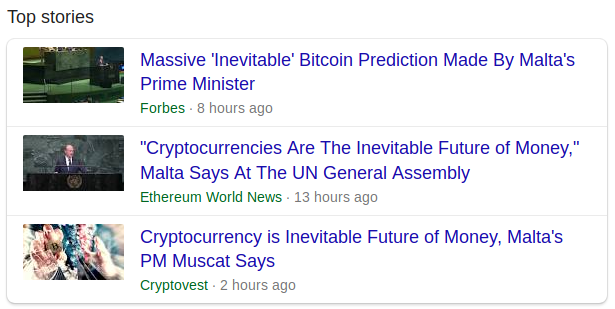Malta, a country of less than half a million people, has had an outsized impact on the cryptocurrency industry. The government of the small Mediterranean nation has made clear that it intends Malta to be a haven for cryptocurrency firms: in July, the Maltese parliament passed a set of bills to create a legislative framework for blockchain technology, signaling that the ‘Blockchain Island’ was open for business.
At the 73rd session of the U.N. General Assembly summit in New York last week, Maltese prime minister Joseph Muscat continued to expound on his belief in blockchain, arguing that cryptocurrency was the future of money.
If you read about this in the blockchain press, you could be forgiven for thinking that this was the only topic of his speech, as a glance at the headlines shows:

In reality, for the majority of the address Muscat discussed migration from Africa to Europe, the changing nature of work in a technological society, and the general need for international cooperation to solve global problems. Mentions of “blockchain” took up only the final two minutes of a 16-minute speech, and linked thematically to his previous talking points on globally connected systems.
Still, Malta is undeniably going big on blockchain and associated technologies. Providing clarity on regulation is a big pull factor for cryptocurrency startups, and the approach has already hooked a big fish. Binance, the world’s largest cryptocurrency exchange by value, announced in April that it would open an exchange on the island after crackdowns in Japan and Hong Kong, with other players looking to follow suit. (On November, 1 the island will also host the Malta Blockchain Summit, attracting speakers from around the world, including John McAfee.)
For Muscat, proclaiming his belief in blockchain to the U.N. General Assembly is more sales pitch than prediction. For most global leaders, blockchain is not a pressing concern, and a two-minute spiel from the head of a nation less populous than Miami is unlikely to change things. On the other hand, for entrepreneurs considering Malta as a business location, the speech sends a clear signal that the Maltese government will advocate for blockchain technology at the highest level, and is sure to drum up extra investment.
For what it’s worth, like Muscat, I also believe that blockchain technology is the future of money. At this stage, I don’t think it’s even a controversial claim: we can clearly see the digitization of low-value financial transactions in everyday life, with contactless credit card payments and “NO CASH” signs in small businesses multiplying by the day. The more this continues, the more demand there will be for a way to transact that’s both digital and anonymous, hence a clear use case for cryptocurrency.
The real question is whether decentralized cryptocurrency is the future of all money, or framed another way, whether money will ever be decoupled from the state. For an economy as small as Malta’s—its GDP was just shy of $11 billion dollars in 2016—this may not have huge implications, but for the U.S., with a GDP of $18.6 trillion and a currency inextricably linked to global trade and finance, a phase out-of the dollar would mean a new world order.
The Maltese Prime Minister talks the talk on blockchain, but it’s the talk of someone who has little to lose and much to gain from its adoption. Becoming “Block Island” is an achievable goal for Malta, and I wish the project the best of luck—but we’re a long, long way from “Blockchain World.”